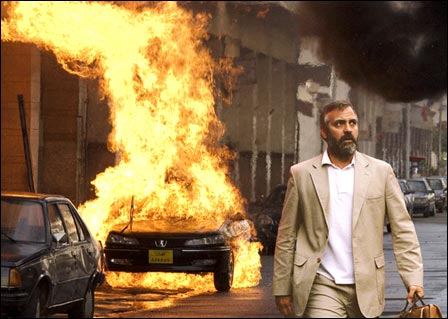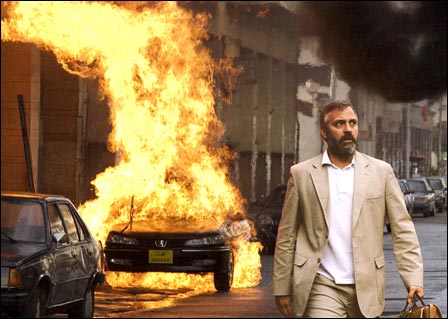Syriana, written and directed by Traffic screenwriter Stephen Gaghan, is a brave and daunting piece of filmmaking. It plunges without apology into hot-button territory few U.S. news outlets, much less Hollywood productions, have dared explore, and does very little to smooth the rough edges for a moviegoing audience accustomed to frictionless entertainment.
In a pop-culture landscape dominated by the aesthetics of adolescents, it is the rare film for adults.

The least explosive scene in Gaghan’s new movie.
Photo: Warner Bros./Glen Wilson.
When I first heard about the “oil movie,” I figured it would be about oil the same way so much is about oil these days, via innuendo and implication, with conspiracy and malevolence hovering shapeless in the background. But no: This really is a movie forthrightly and directly about oil — who has it, who sells it, who buys it, and who gets caught up in its grinding gears.
The plot — multiple interweaving strands, a structure familiar to Traffic fans — is baroque in its complexity. Gaghan defiantly refuses to provide any but minimal exposition, and events rush by with the speed and intensity of a political thriller.
At the core of the movie is a fictional oil-producing Persian Gulf country. The emir is aging and his two sons — the older, educated reformist (sharp-eyed Alexander Siddig, an actor to watch) and the younger, dissolute hedonist — jockey for the throne. The emir has just awarded drilling rights to a Chinese company, which doesn’t sit well with Connex, a huge Texas firm. Connex is in the midst of a merger with a smaller firm, whose shady dealings with Kazakhstan are being investigated by a Justice Department lawyer (Jeffrey Wright).
The reformist prince is advised by a hotshot young oil-industry analyst (Matt Damon) to whom he feels a debt after a tragic accident, and targeted by a worn-down CIA spook (George Clooney).
And in the movie’s least-integrated, least-organic, but no doubt most politically controversial thread, a young Pakistani worker, abused and laid off from his oil-field job, finds himself radicalized in an Islamist madrassa.
Sinema Verite
The action cuts among these threads at breakneck pace, and it is only in the final 30 minutes or so that the connections among them become clear(ish). Even with close attention, viewers are bound to feel a few steps behind; I expect multiple viewings would be rewarded.
As if that weren’t enough to scare off Joe Sixpack, Gaghan refuses to illuminate more than a sliver of his characters’ inner lives. One character’s child dies; another struggles with a disappointed teenage son; another is haunted by his hard-drinking father — but these scenes are little more than quick, sharp jabs to the gut. It’s a bristly film, free of sympathy or uplift, difficult to engage emotionally, with a cold, anxious vibe rare outside indie cinema.
The movie is neither a melodrama nor a didactic sermon about the evils of Big Oil, but an almost obsessive work of observation. It contains a wealth of detail, reflecting Gaghan’s meticulous research (drawing heavily on See No Evil, the tell-all book by ex-CIA agent Robert Baer). Milieus most Westerners know only from media caricature — the debauched underground nightclubs of Tehran, the madrassas of Pakistan, the inner warrens of Beirut, the palaces of Middle Eastern emirs — are depicted here with an unflashy documentary realism.
More than anything, Gaghan seems eager simply to show us: here it is. All that stuff you’ve heard so much about, the subject of so much charged rhetoric and political grandstanding: here are those people and places. Take a look.
There isn’t a false note struck along the way, but special notice must be given to George Clooney, whose jaunty charisma is utterly submerged under a scruffy beard, paunchy gut, and morose mien. Clooney’s CIA agent is slowly becoming aware that he’s a relic of a former age, soon to be discarded, and the actor carries the weight with quiet, understated accuracy. After Good Night, And Good Luck and Syriana, Clooney has shaken his playboy image — or at least enriched it — by becoming a champion of serious, socially conscious cinema.
Over a Barrel
Grist readers will no doubt be curious about the environmental lessons of the movie. They may be disappointed to hear that there aren’t any, at least in the traditional sense. There is no mention, even in passing, of global warming or air pollution.
I don’t know if this is deliberate, but regardless, it serves as an indirect illustration of what I took to be Syriana‘s central message, which might be summarized thusly:
There is only the fight for resources.
All else is ephemera: The rule of law in the U.S. Transparent democratic government. International treaties. Reform in the Middle East. Even our most cherished ideals, our most personal relationships. These are bourgeois preoccupations that crumble like dust when they come between the powerful nations of the world and the resources that fuel them. Oil is running out, and the only law left is the law of the jungle. “Corruption,” says a memorable character played by Tim Blake Nelson, “is why we win.”
I have only one small quibble with what is one of the most intellectually and politically galvanizing movies of our young century.
The global oil system is portrayed as a gigantic, impersonal machine that crushes human lives, families, even whole nations. The CIA agent, the reformist prince, the oil analyst, the federal prosecutor: they all show small glimmers of idealism and hope, but all are ultimately dispatched, leaving not so much as a ripple.
The one crack — the one gear that slips out of its groove and threatens the machine — is the hopeless, enraged Pakistani boy. The terrorist.
But there is an odd and rather glaring omission. Gaghan follows a long, grim chain of greed, corruption, and deceit, but he doesn’t trace it to its terminus: the folks using the oil. Us. The viewers of his movie. Conspicuous U.S. consumption serves as his unquestioned backdrop — and his silence about us ultimately reveals his fatalism about the fortunes of democracy.
Is there really so little spark left in the American experiment that public acquiescence to escalating global resource struggles is a fait accompli? There’s no chance we could self-organize to use less, and twist the arms of our elected representatives until they help us? Are we so apathetic, so powerless?
I’m not ready to give up that hope. Not yet.


